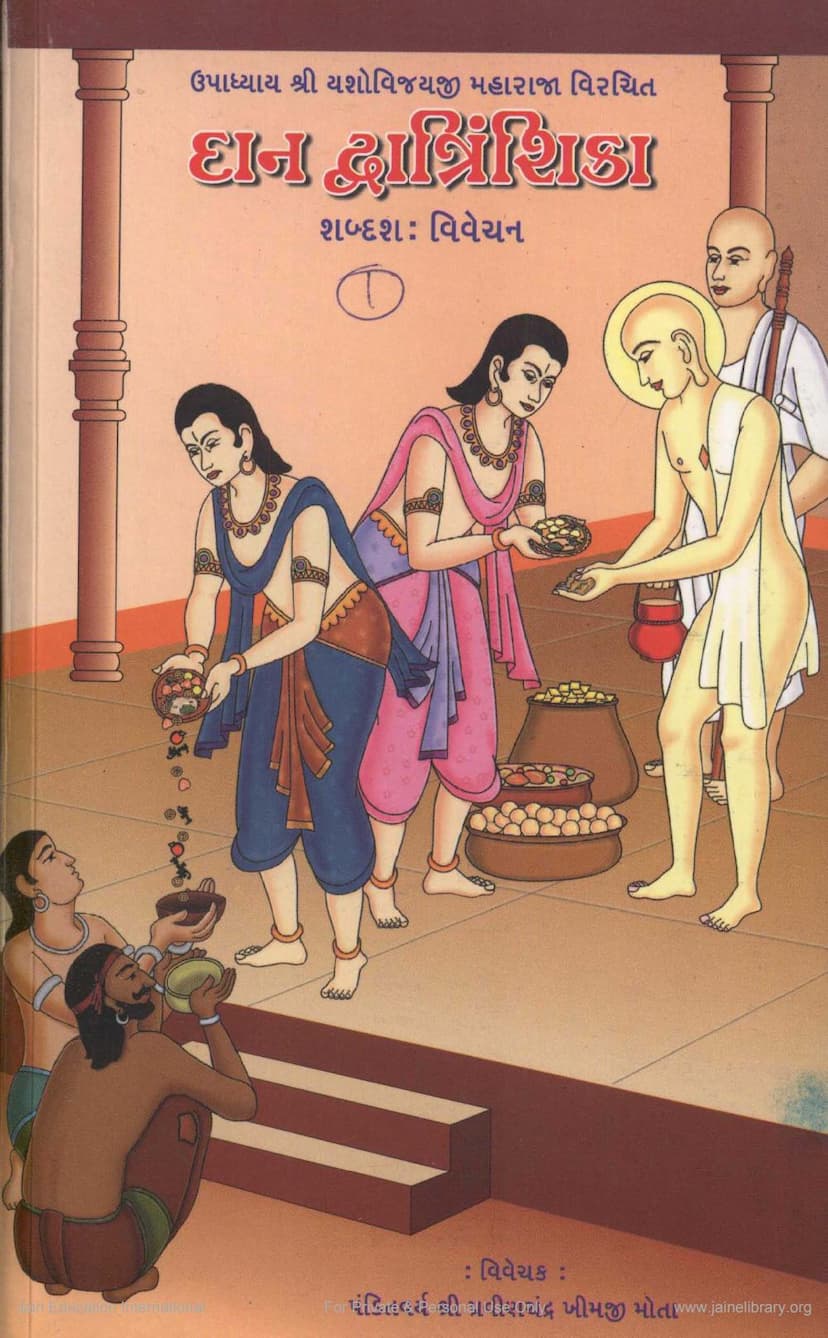Dan Dvantrinshika
Added to library: September 1, 2025

Summary
Here's a comprehensive summary of the Jain text "Dan Dvātrīśikā" based on the provided pages:
Title: Dan Dvātrīśikā (Under the larger work, Dvātrīśad Dvātrīśikā) Author: Mahāmahopādhyāya Upādhyāya Shri Yashovijayji Maharaj Commentator/Translator: Pandit Varya Shri Pravinchandra Khimji Mota Publisher: Gitārth Gangā, Ahmedabad Theme: This text is a commentary on the chapter concerning 'Dan' (Charity/Giving) within Upādhyāya Shri Yashovijayji's larger philosophical work, Dvātrīśad Dvātrīśikā. The "Dan Dvātrīśikā" specifically delves into the nuances of charitable giving according to Jain philosophy.
Core Teachings and Structure:
The "Dan Dvātrīśikā" expounds on the principles and practices of giving, categorizing it and explaining its significance for spiritual progress. The commentary meticulously analyzes each verse (śloka) of the original text.
Key Concepts Discussed:
-
Two Types of Dan: The text primarily distinguishes between two forms of charity:
- Anukampā Dān (Compassionate Giving): This involves giving with the intention of alleviating the suffering of others. It is described as giving happiness related to Indra (a celestial being, symbolizing worldly happiness) and, indirectly, is a cause for liberation (moksha).
- Supātra Dān (Giving to Worthy Recipients): This involves giving to deserving individuals (like monks and nuns) with devotion. This is considered a direct cause for liberation.
-
The Importance of Intention (Bhāva): A central theme is the critical role of the donor's intention. While external actions of giving might appear similar, the internal state – whether it's pure compassion (anukampā), devotion (bhakti), or mere adherence to tradition without genuine understanding – significantly influences the karmic outcome.
-
Context and Appropriateness (Kāla and Sthāna): The text emphasizes that the effectiveness and spiritual merit of giving depend on the context.
- Anukampā Dān: It is most effective when given at the right time and in appropriate circumstances, especially when it fosters the propagation of Jain teachings (pravachananunnatya) and leads to the spiritual upliftment of others (bījādhānādi). Giving to the needy without considering the broader spiritual implications can be less effective or even detrimental.
- Supātra Dān: Giving to worthy recipients (like monks) with devotion, while observing the proper conduct (dāna vidhi), is crucial for maximum spiritual benefit.
-
Distinguishing Between Types of Giving:
- The text carefully differentiates between giving with genuine compassion or devotion versus giving out of social obligation, ego, or without proper consideration for the recipient's spiritual needs or the potential karmic consequences.
- It addresses situations where giving, even with apparent compassion, might unintentionally support negative tendencies in the recipient, leading to the donor incurring karmic consequences. This is contrasted with instances where the giving is genuinely beneficial for the recipient's spiritual upliftment.
-
The Role of the Recipient: The text highlights the importance of the recipient's spiritual stature. Giving to a true monk (samyat) is generally more spiritually rewarding than giving to an untrained individual or someone who misuses the charity. However, even in giving to an untrained individual (asamya), if done with genuine compassion (anukampā) and with the intent to provide spiritual benefit, it can still yield positive results.
-
Analysis of Different Scenarios:
- Giving to Monks (Samyat): Pure giving to monks is highly praised. Even impure giving to monks, if done with specific extenuating circumstances (like famine, illness of the monk, or long travel) and with a proper intention, can still be beneficial.
- Giving to Laypersons (Shravaka): Giving to laypersons, especially those who follow Jain principles, is also discussed in terms of its spiritual merit.
- The Concept of "Bhajanā" (Varied Outcomes): In certain situations, particularly concerning giving to monks who may not be perfectly pure in their practices (uttara-guṇa-aśuddha), the outcome of the giving can vary (bhajanā). This depends on the donor's intention, the monk's receptivity, and the specific circumstances.
-
Critique of Misguided Giving: The text strongly advises against giving that inadvertently supports harmful actions or tendencies in the recipient. Such giving, even if motivated by a superficial sense of compassion, is criticized as being ultimately detrimental and not truly compassionate.
-
The Role of the Commentator: Pandit Varya Shri Pravinchandra Khimji Mota's commentary is noted for its meticulous word-by-word analysis, making the profound philosophical concepts of Upādhyāya Shri Yashovijayji accessible to a wider audience. The preface highlights the intellectual depth and scholarship of both the original author and the commentator.
Overall Significance:
The "Dan Dvātrīśikā" serves as a detailed guide for understanding the principles of charity within Jainism. It moves beyond a superficial understanding of giving, emphasizing the profound impact of intention, context, and the spiritual caliber of both the giver and the receiver. The commentary by Shri Pravinchandra Khimji Mota is crucial in elucidating the intricate philosophical arguments presented by Upādhyāya Shri Yashovijayji, making this text an invaluable resource for scholars and practitioners seeking to deepen their understanding of Jain ethics and spiritual practice. The publication by Gitārth Gangā aims to make such profound texts available for the benefit of the Jain community.